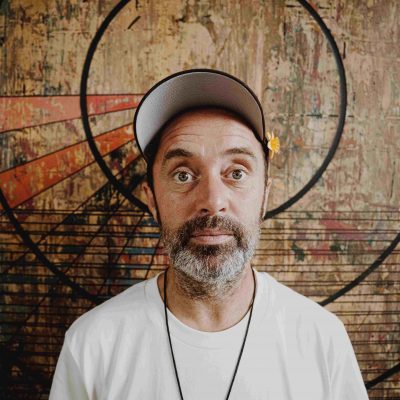Tickets are now available for The Blinders at Rescue Rooms!
It’s no understatement to say that the notion of perspective has been at the forefront of The Blinders’ minds with vanishing points of the heart and soul giving depth and texture to their Nick Launay and ‘Atom’ Greenspan co-produced third album, the aptly titled, Beholder.
“For the songs on this record, I would imagine these scenes playing out inside my head,” explains singer-guitarist Thomas Haywood, “and I would describe the character within each one as The Beholder. It made me think about how you understand life from where you witness it. That sense of seeing is believing and understanding through what you’ve seen. This record is about leaving adolescence and becoming an adult, so your experience and your perspective change.”
Having almost wrecked his own vision due to the black, mask-like warpaint which he used smear across his nose, cheeks and forehead – and then sweated into his eyes – when the Doncaster band toured their first two albums, the politically-charged debut, 2018’s Columbia, and 2020’s seductively sinister Fantasies Of A Stay at Home Psychopath, Haywood is particularly attuned to the nature of vision, and how it helps to define the experience of audiences and creators alike.
“Ambiguity plays a massive part in the enjoyment of music or art,” he declares of the shifting musical visions Beholder offers. “You rely on your imagination to fill in some of the gaps, so it’s always dependent on the individual. Some people have massive reactions to things, others don’t, it’s down to each person’s imagination. That is why art shouldn’t be served up on a plate, locked in black and white. It should be open to interpretation.”
The Blinders’ third album certainly revels in creative freedom, in no small part because the now Manchester-based group’s line-up changed in the build-up to making Beholder, though they have reveled in that ambiguity and flux that upheaval generated.
After their previous drummer left the group in 2020, Thomas ‘Cass’ Castrey who used to be the band’s tech on the road took over the drum stool full time, while keyboard player Johnny James was also recruited as Haywood and Doncaster school friend and fellow Blinders’ founder, bassist Charlie McGough, realised the interruption in their band’s life opened more possibilities than the doors it closed.
“It was an opportunity to expand,” reasons the singer. “Why stop at just replacing someone, or even trying to do something that you are not going to be able to repeat? Why not just do something different? So it was an opportunity to take action and make something of it. Cass and Johnny joining massively changed the kinds of songs we could write. There was so much more room musically, so it was a really, really exciting time. It’s been like a pendulum; we’ve gone into the chaos of upheaval and now it’s swung back as we’ve found a way to come together.”
As the line-up solidified – the group were also aided on this album by former Cabbage and Twisted Wheel guitarist Eoghan Clifford – The Blinders engaged in an intense period of demoing as many song ideas as they could fully realise, as they began to forge and understand the new musical relationships that were blossoming within the group (some of that process was captured on 2021’s experimental Electric Kool Aid Parts 1 & 2 EPs). Once they found their confidence and a shared assuredness of intent as a group, these ideas developed to eventually become Beholder.
Able to make the most of their Manchester base at Brunswick Mill to work on music five-days-a-week, before builders then snatched this important hub from the city’s musical community (“No one would use it but musicians, then when musicians get it looking good fucking property developers buy it and kick you out,” explains Haywood of the loss of the 19th century, previously derelict factory), around 20 tracks we readied for consideration for a new record. However, when the four-piece took a step back from their instruments and considered the body of music before them, this wider perspective made them realise that there were key themes running across the work which would define the album.
“We found ourselves writing a lot of sister songs,” recalls Haywood. “You can’t help but explore an idea, so we would write several songs around it and then move on to another one. We were really meticulous and strict with ourselves this time, really conscious about exploring the details. I remember Charlie and I walking to practice one day and we agreed we weren’t going to be sentimental, everything could be ripped up and taken apart because we now had different voices bringing ideas to the table. So when we emerged at the end of this process with ten songs that really stood out and were different from the others, we knew we had an album.”
After Nick Launay and ‘Atom ’Greenspan agreed to produce the album in Los Angeles, The Blinders decamped to a stripped-out cottage in rural Wales to drill down and create a final, focused demo that they could take to America as a blueprint of Beholder.
“The Wales trip was tight,” explains McGough. “When you’ve got a lot of songs you don’t feel like you know any of them too well, and you have to find the record within them. That time brought everything together. We sat down on the last night of that trip and it became apparent quickly we all felt there were seven or eight core songs that had to be on the record. That trip was really important because although we recorded in LA, it doesn’t sound like an LA record. The sound was defined in that cottage.”
First track ‘Ceremony’ shares a frenetic energy with The Blinders’ previous albums, but with Launay and Greenspan’s astute rock production revealing greater depths, even this cyclonic opening salvo, demonstrates the wider atmospheres, bristling emotions and sophisticated textures that sprawl through Beholder. Tracks like ‘Brakelights’, ‘Always’ and ‘Swallowing Static’ chime with fuzz-drenched vigour and bright melodies, but there are also intoxicating sonic shadows accompanying the blistering burns. ‘Nocturnal Skies’ revels with a yearning, hopeful spirit; ‘Iggy Got Camaro’ has a seductive whirl that emerges from a beguiling, almost music box melody; while ‘Waterfalls Of Venice’ marries the band’s angry social observations with a personal desperation as it sweeps rollercoaster-like through minimal then maximalist twists and turns.
“I was writing these lyrics at a time when there wasn’t a lot of society going on, right in the middle of lockdown, so you have to look somewhere else,” notes the vocalist of the shift away from his more overtly political subject matter to the more internalised expression of pain and anger. “As quickly as good things happen, so do bad things,” he notes sagely. “My contributions to records began at a time where every aspect of life that you’re told is going to be difficult to deal with all happened at once. It proved a really creative period for me, because escape is a key aspect of this.”
In a way, songwriting became a crucial way of dealing with Haywood’s experience of loss, particularly around a time when the subject was also plastered all over the news daily due to the pandemic’s impact.
“Why do I write every day? I have to write every day because it makes me feel better, it’s expelling something,” explains Haywood. “So I think a big part of the album is loss, and loss is a big part of growing out of childhood and into adulthood, right? You experience death for the first time, especially of loved ones who helped to sculpt the person you are. That is life, it’s what everyone is expected to deal with, but no one can prepare you for it. Being able to take a step back from it now, I realise the lyrics are written from the perspective of someone moving through that change. And songwriting-wise, darkness is really easy to tap into, musically and lyrically. There’s just something powerful and emotive about those feelings that speak to you in a way nothing else can – especially when you’ve got it all going on.”
“I was drowning myself in Byron, that’s where all the melancholic comes from,” he now laughs. “Shelley and Keats too. I was just obsessed with their work. I was sort of building this dark landscape around myself with their writing and I ended up going super far in. I couldn’t help myself.”
With all these shifting dynamics – line-up, sounds, lyrics – there is the potential danger that some groups might lose sight of their identity or succumb to innovation for innovation’s sake, yet Beholder’s triumph is that while it has truly moved The Blinders forward, redefining their parameters and possibilities, on a fundamental level the record remains true to their core artistic values as a band. Perspectives may have changed for Beholder, but The Blinders’ instincts remain true.
Perspectives may change, but The Blinders’ vision is joy to behold.
For more events, check out what’s on here.



